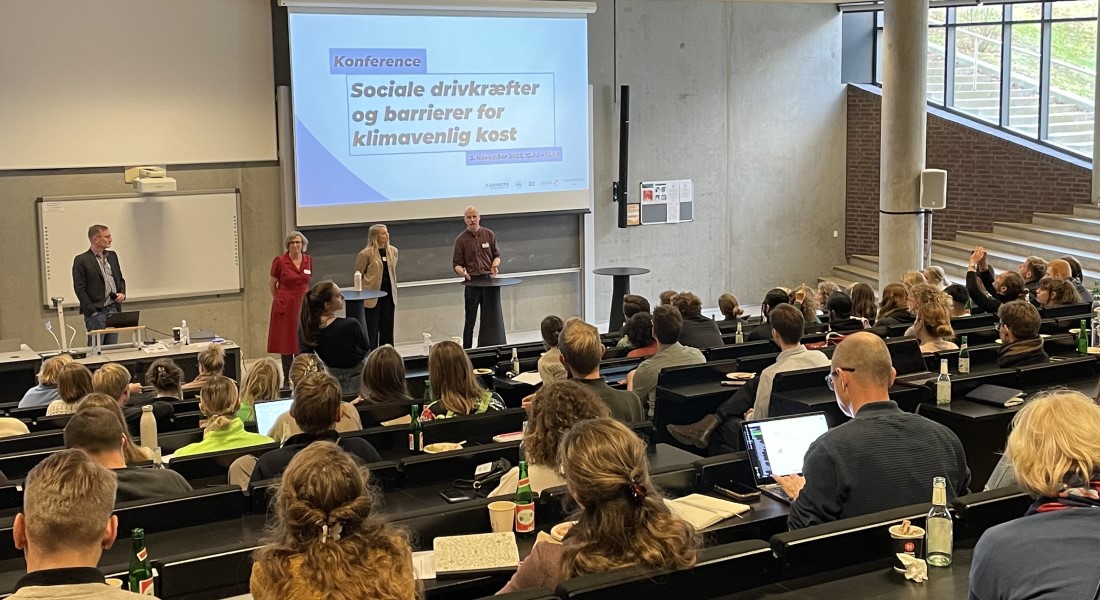Almost every other Dane is trying to cut back on meat
Almost half of the Danish population is trying to reduce their meat consumption, research into the Danes’ relation to green and climate-friendly food shows. For some, it is easy, while others face great social and practical barriers when they try to change ingrained habits.

New habits are simmering in kitchens all over the country. Even though most dinner tables still include meat, as much as half of the population is currently trying to reduce their daily meat consumption – some more successfully than others.
These are the first results of a large-scale research project, which i.a. has mapped 3,000 Danes’ position on and experience with green and more climate-friendly food. The goal is to outline social motivations and barriers when it comes to climate-friendly food (see box).
According to the survey, no less than 43 per cent of the respondents say they have reduced their meat consumption, while 54 per cent describe themselves as ‘omnivorous’, meaning that they do not give much thought to how often they eat meat or how much they eat. Vegetarians and vegans only represent a small part of the population (see figure).
Figure 1. How the Danes position themselves in four food groups
According to Professor Bente Halkier from the Department of Sociology, the numbers reveal a shift in the Danes’ view on diets containing a lot of meat.
“It is interesting that so many people are reporting that they are in[BH3] the process of reducing their meat consumption in favour of more climate-friendly dietary habits. In Denmark, our food culture is largely based on meat, and when it comes to food, we are part of the 10 per cent with the largest carbon footprint in the world,” says Bente Halkier.
“But the study also shows that the potential for changing our dietary habits in favour of a greener diet is significant. The fact that only few are vegetarians or vegans is less important – and that is even though you get a slightly different picture when you look at well-educated young people living in the city. To really make a difference, we need the majority to cut back on their daily meat consumption.”
Social and practical barriers
At the same time, the study questions how great these dietary changes really are. Because while 80 per cent of the omnivorous part of the population say they ate meat the night before, the same applies to 69 per cent of the part of the population who say they are cutting back on meat. A similar pattern emerges when the researchers ask the respondents whether they had beef or lamb – which are both highly detrimental to the climate – for dinner the previous day: This was true of 35 and 27 per cent, respectively.
The study cannot say whether the group cutting back on meat generally eat less meat per meal. This may be significant, though, as meat-free days is not the only way to reduce one’s meat consumption. According to Bente Halkier, the small measurable difference may also be a result of the fact that the group cutting back on meat is large and complex, and that many face various barriers.
“Only a third of those who are trying to reduce their meat consumption experience none or only minor obstacles, while just as many experience significant obstacles. This includes e.g. lack of support from others, difficulties preparing meat-free dishes or simply missing the taste of meat. The rest are somewhere in-between or do not really care what they eat,” she explains.
Requires a general effort
According to Bente Halkier, the results of the study stress the need for easy access to green everyday food and attention to the influence our social network has on us. Other, more preliminary analyses of data from the study suggest that we are far more inclined to change our dietary habits when we interact with people at home, among friends or elsewhere who either eat very little or no meat.
“Solutions targeted at the individual citizen – such as more information or a meat tax – are not enough if we really want to lower the country’s total meat consumption. We also have to normalise the alternatives and make them easily available, because our everyday habits and social relations both represent key barriers and key drivers,” says Bente Halkier.
However, according to Bente Halkier, we are already in the process of normalising greener dietary habits. She stresses that even among those who eat a lot of meat, almost two in three know someone who has changed their dietary habits.
“The study also shows that a lot of those trying to eat less meat say that the barriers become fewer in time.”

Conference attracted an audience of 150 for a debate on climate-friendly food
A number of stakeholders from the climate and food sectors met when the Department of Sociology and the think tank CONCITO presented the first results of the project and debated green dietary habits at a conference hosted by the University of Copenhagen on 3 November.
At the conference, representatives of the Danish Consumer Council, the City of Copenhagen, COOP Danmark and Planteslagterne debated how different actors can make it easier for the Danes to choose climate-friendly foods.
On a general level, the debate suggested that there are no cure-all solutions, but that a number of actors can promote green, climate-friendly food. Initiatives may include introducing greener food in public institutions, developing new, tasty products and utilising retailers’ daily contact with customers.
The conference presentation is available via CONCITO’s conference page (in Danish only).
Contact
Bente Halkier
Professor
Department of Sociology
Email: beh@soc.ku.dk
Telephone: +45 35 33 50 44
Mobile: +45 21 62 96 94
Søren Bang
Journalist
The Faculty of Social Sciences
Email: sba@samf.ku.dk
Mobile: +45 29 21 09 73
